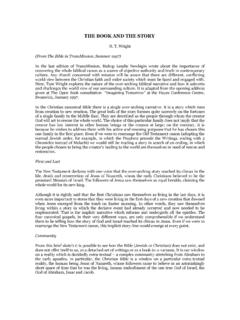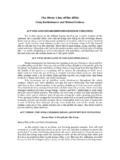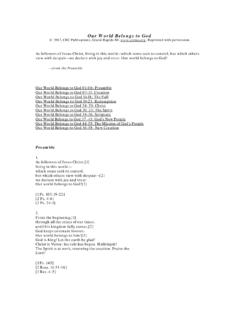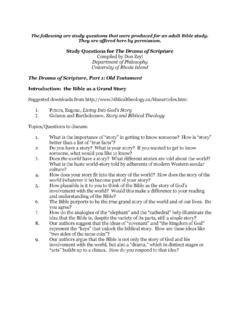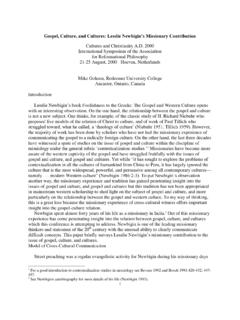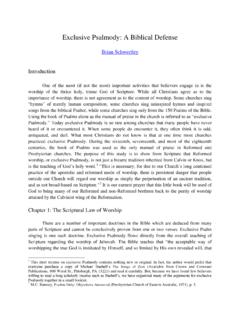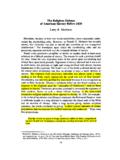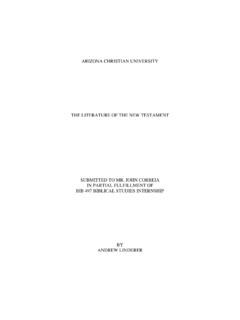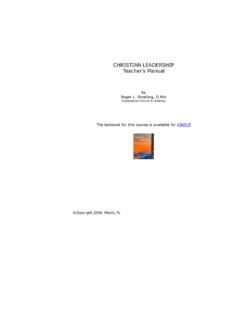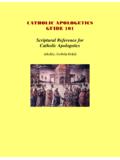Transcription of Chapter 11 - Systematic Theology Williams Final A
1 11. Systematic Theology AS a biblical DISCIPLINE. MICHAEL Williams . Professor of Systematic Theology _____. INTRODUCTION. In Between Two Horizons: Spanning New Testament Studies and Systematic Theology , a group of biblical theologians and Systematic theologians came together to discuss and write on the relationship between Scripture, hermeneutics, and Systematic Theology . The contributors to the project . perhaps somewhat to their own dismay, but not surprisingly at all quickly located the disciplinary Moloch that seems to haunt all discussions of the relationship between biblical Theology and systematics: what are we to make of Systematic Theology ?
2 The participants could reach no consensus on the question. Our disagreement on this score, write the editors, had to do with ongoing controversies among systematicians regarding definitions of their task as theologians and with some of our own caricatures of Theology ' as attempts merely to organize the core, historic doctrines of Christian faith. 1. While there has been a spate of attempts to offer some definition of the discipline in recent years,2 these attempts have usually come through the 1 Max Turner and Joel B.
3 Green, New Testament Commentary and Systematic Theology : Strangers or Friends? in Max Turner and Joel B. Green, eds., Between Two Horizons: Spanning New Testament Studies and Systematic Theology (Grand Rapids, Mich.: Eerdmans, 2000), 12. 2 , Robert K. Johnston, ed., The Use of the Bible in Theology : Evangelical Options (Atlanta, Ga.: John Knox, 1985); Trevor Hart, Faith Thinking: The Dynamics of Christian Theology (Downers Grove, Ill.: InterVarsity Press, 1995); Charles J. Scalise, From Scripture to Theology : A Canonical Journey into Hermeneutics 197.
4 198 ALL FOR JESUS. elucidation of theological hermeneutics. Theologians describe what Systematic Theology does (or should do) and set down some guidelines for the doing of it, but never quite define just what it is that is done. When definitions are proffered, they have tended toward either the banal such as the organization of doctrines or the outright dismissive and demeaning. Systematic Theology , we are told, is the product of a Greek philosophical mind, and as such is foreign to and subversive of the Christian faith's actual substance and shape.
5 It is argued that the emphasis upon topics rather than story, rationality rather than action, and ideas rather than persons suggests that Systematic Theology is simply the wrong tool for the job. In the doing of Systematic Theology , the particularity of the biblical story is absorbed into the abstract, the relational into the cognitive, the historical into timeless truth. In contrast, it is said that the Christian faith invites us to accept the biblical story as our story, to know and live within an encompassing drama that produces Christian identity and calls us to live within a transformed and transforming community for the sake of God's kingdom mission over all things.
6 In short, its critics say that systematics makes no claims upon us and nurtures no relationships, but merely encourages us to bend the Word of God to questions not of its own asking. I have cited no examples of these criticisms of Systematic Theology . I have said them all myself. And I am a Systematic theologian. My goal in this essay is to present a defense of Systematic Theology , a discipline that suffers from decidedly poor reviews within present Christian academia and some sectors of the church. Along the way, I will offer my own definition of Systematic Theology , one that is humbler and more circumspect than some would like, but one that is defensible in light of the sources and calling of the theologian.
7 My thesis is simple, but, I believe, profound and I will argue that Systematic Theology , within the evangelical and Reformed tradition,4 is (Downers Grove, Ill.: InterVarsity Press, 1996); David K. Clark, To Know and Love God: Method for Theology (Wheaton, Ill.: Crossway, 2003). Aside from these evangelical contributions, see David H. Kelsey, The Use of Scripture in Recent Theology (Philadelphia, Pa.: Fortress, 1975) for a liberal treatment of theological hermeneutics, and Gerald O'Collins and Daniel Kendall, The Bible for Theology : Ten Principles for the Theological Use of Scripture (New York: Paulist Press, 1997) for a Roman Catholic treatment.
8 3 Profound in the sense that I wish I had been exposed to it somewhere during my theological studies (I was not), and provocative in the sense that it will produce a measure of discomfort among many of my peers. 4 By limiting myself to the evangelical and Reformed tradition, I acknowledge the possibility of other ways of envisioning and doing Systematic Theology . As theological reflection is oriented to the resources Systematic Theology AS a biblical DISCIPLINE 199. properly bound by the Reformation principle of sola scriptura, and thus should be regulated by the scriptural message and by sound biblical hermeneutics.
9 Systematics is, first of all, a biblical discipline, and not a speculative one. Far too often, the Bible has functioned merely as a limiting principle within Systematic Theology , a negative stricture: if Scripture does not disallow an idea, we are free to employ it. Thus, the Bible is more of a constraining authority than a positive guide to Theology . My thesis, however, is that Scripture must be allowed to lead our theological reflection rather than merely test it. While those who take the approach toward systematics just described may, and often do, appeal to the authority and even the inerrancy of Scripture, the Bible often fails to function for them as a constructive guide.
10 I want to argue this precise point: the biblical narrative structure, the story of God's relationship with his creation from Adam to Christ crucified and resurrected to Christ triumphant in the restoration of all things in the kingdom of God forms the regulative principle and interpretative key for Systematic Theology no less than it does for biblical Theology . This suggests that a Systematic Theology that is oriented to the biblical narrative and scriptural ways of knowing ought to be redemptive- historically grounded rather than ordered to a cultural convention of rationality or an extra- biblical conception of system.
